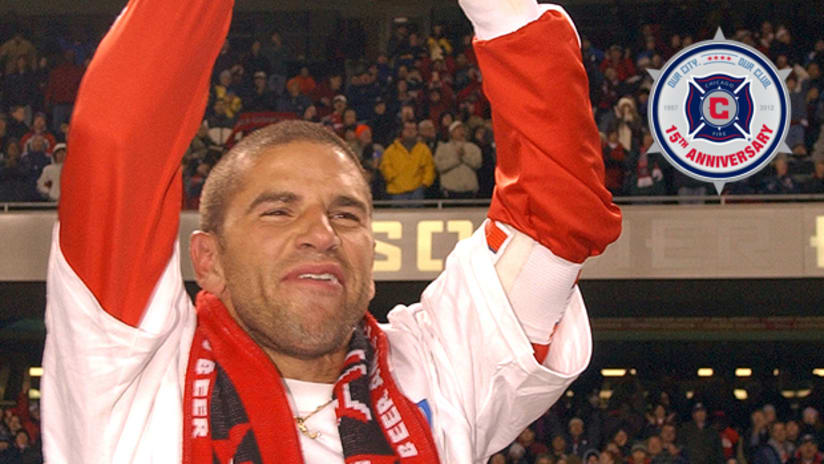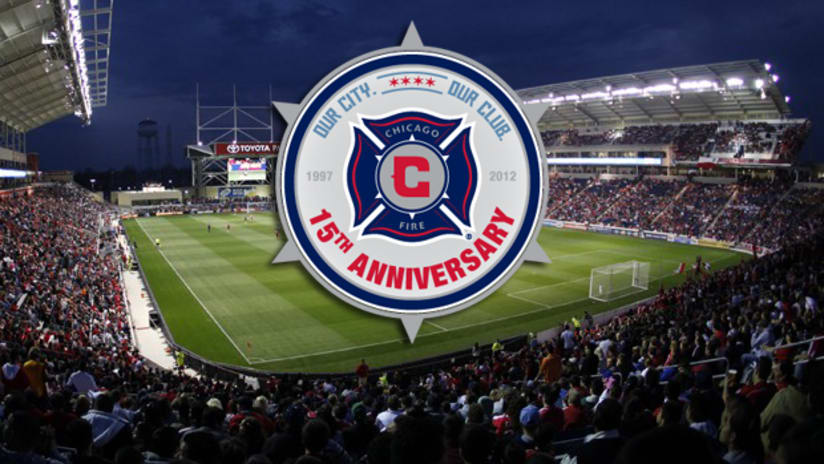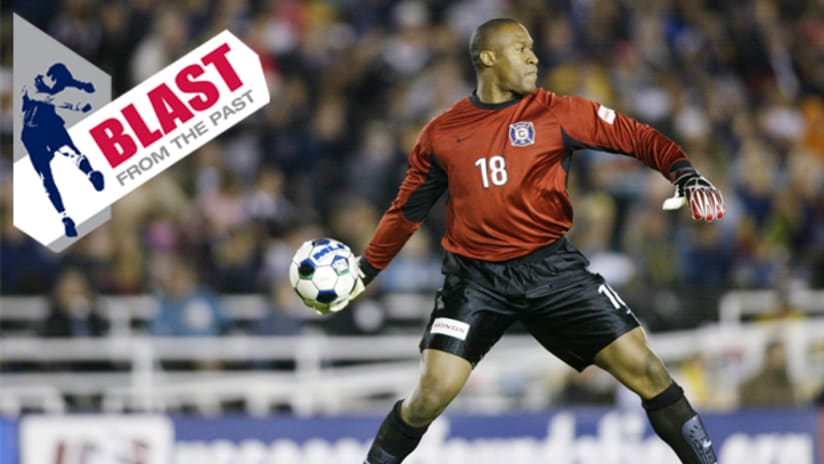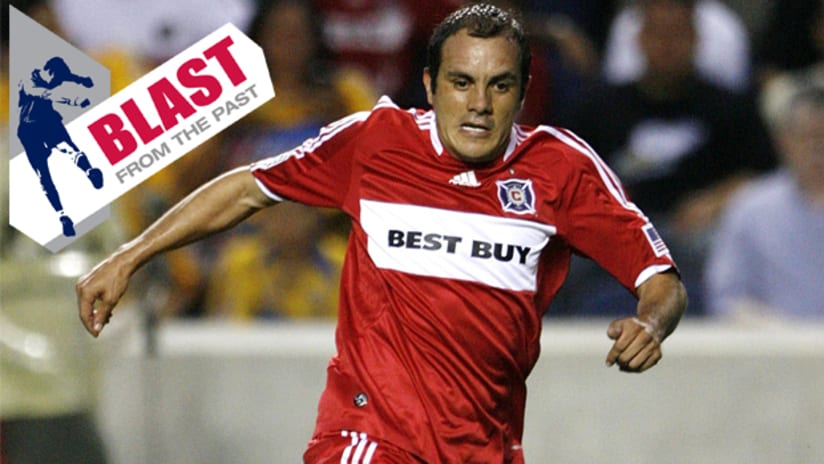With less than a month until the club celebrates it's 15th Anniversary, we've delved deep into nostalgia territory by ringing up Fire legends past to catch up on what they're doing now, find out what made them successful here and get their greatest memories of their time with the Men in Red.
In our first piece, Jeff spoke to former Fire captain Chris Armas about how things are going in his current gig as head coach of Adelphi University's women's team, thoughts on an MLS return to coaching and his opinion on the best Fire player of all time.
Jeff Crandall:Last year you took over the head coaching job for the women’s team at your alma mater Aldephi University, how’s it going? Is there a difference in coaching men and women?
Chris Armas: It’s going well. I’m enjoying the process of putting a stamp on a program and helping the young student athletes on and off the field. We play a nice brand of soccer and it keeps getting better. A year later we’re much further along.
It’s not different coaching females. I think there’s a bigger difference from college soccer to professional soccer. If I was coaching men, I still think there would be the same differences and challenges that come because there’s just not enough of the game for the true soccer people who are used to doing it 10 months out of the year. At the college level, doing it for just the three or four months, it’s a whirlwind with lots of games in a short amount of time. Then there’s so much other time you have to spend on recruiting and the other aspects that go into it.
JC:Sounds like you miss the pros a little bit… Do you ever think about coaching at the MLS level again?
CA: I think about it, certainly. It’d be a great challenge, that level is so much of what I do know as a soccer player. I feel I have a good feel for the league and enough of the technical directors, coaches, former teammates and opponents.
It’s just about what makes sense for this time in my life. In order to do that it’s a massive commitment that you need to be physically and emotionally all-in for. Until I can say that, it’s just a thought for right now. It’s certainly something that has circled inside my brain and my heart.
JC: How closely do you follow the team in New York? I’m assuming you keep tabs and still talk to some guys.
CA: I follow the team very closely, especially because Frank [Klopas] is still involved. The respect and relationship I have with him is special. There are also enough familiar faces around there: Logan Pause is another really good friend of mine, Chris Rolfe back in the mix, being around when we drafted Patrick Nyarko. There are a lot of reasons why I still stay connected to the team and MLS in general.
Chicago was really my first home for 11 years and I’ve always felt like a Fire guy. Certainly I’m still watching the team very closely.
JC: As someone that was there almost from the very beginning and has been such a big part of the club, what does the Fire’s upcoming 15th anniversary mean to you?
CA: In the early years in Chicago I was involved in some pretty good teams and I was lucky to be a part of that as things were built. We set a high bar and standards for the way things should be done in terms of the process, every single day what it means to be a professional on the field, in the locker room and the community. That was set by Peter Wilt, Bob Bradley and some good leaders in the locker room.
I think for the good of the team and organization, the expectations are high. Here we are 15 years later and look where the team is. I think there’s a certain respect that goes around the league when you hear the name Chicago Fire. It’s nice to see the team hitting that standard and trying to get themselves into the playoffs. The staff there has put together a team that can really make a run at a championship.
JC: When you look back does it feel like it’s been almost 15 years since the MLS Cup and US Open Cup double?
CA: Yeah, it seems like it’s been quite a while. When you stop playing it almost feels like it’s a different lifetime. I know I played in the league not too long ago but it’s hard to fathom doing what we did at a high level for so long.
It’s hard to believe that I did it for as long as I did -- 11 seasons as a player in Chicago, two in LA. Thirteen years is like a blur. When you think back to those first years, it doesn’t seem like that long ago with [Hristo] Stoitchkov, [Ante] Razov, [Josh] Wolff, [Peter] Nowak, [Jesse] Marsch and C.J. [Brown].
I call those the good old days because there was nothing better than that. Those years in Chicago are ones I’ll never forget.
JC: By your judgment, who’s the best player you ever played… (interrupted)
CA: Peter Nowak. He’s the best.
JC:…with…
CA: He’s just the ultimate soccer player. With Peter he was just a guy that on almost every level had such a good understanding. His soccer IQ was so high in terms of making the right decisions in games. Technically he rarely had a bad touch. He was a competitor like no other, in training and in games, even in an All-Star game. People would ask what he was doing and he would respond by saying, “What do you mean? There’s no other way. You step on the field, you have to compete.”
With the ball he had a rare ability to break down defenses with the pass or dribble. He was a good team guy. He spoke English, he made himself part of the team from the moment he got here, whether it was in games or a team barbecue.
On almost every single level, he got it. That’s the guy I watched. In the locker room, what he did with his shoes. After games, what he did in pre-game on the field, how he trained… I got to play against him a lot in training.
For me, I asked where are the flaws in his game? He was just a complete soccer player, a difference maker. He’d hit a 50 yard ball in the air on a dime. So many guys need five or six chances to score or do something special. All he needed was one. He was just a fantastic soccer player.
JC: On a recent podcast with Logan Pause he talked a lot about how much he admired your attention to detail as a player. What do you think he meant by that?
CA: I think what that means for me is that I paid attention to the little things. I believed the little things added up to big things. I knew that on game day, I wasn’t going to be pushing magic buttons, I wasn’t that type of player. Talking about the little things, that means taking care of yourself – doing all the little things to prepare, self evaluating, being honest off the field.
CA: On the field, the technical drills… It sounds cliché but literally, working at technique, technique and technique. Being able to execute that in games and being able to work at the craft every day. That meant coming early and staying afterwards. I felt like I had some ability but it was followed up by hard work and the mentality, staying grounded.
Going to national team camps and having to balance something like a World Cup qualifier and then coming back with a mentality of getting to work and having the guys see that. It sounds simple but it’s just focusing on all the little things.
JC: Lastly, what do you count as your best performance in a Fire shirt?
CA: I think the conference championship in 2003 was a good one. I ended up scoring the Golden Goal but it was more about the performance throughout that game. I don’t remember performances so much. I think at the end of a match I would hope people said, “Good game Chris.” I think if I piled a lot of those up, that’s what was memorable.
Chris Armas Tribute Video
Fire15
Blast from the Past: A Q&A with Fire Legend Chris Armas




